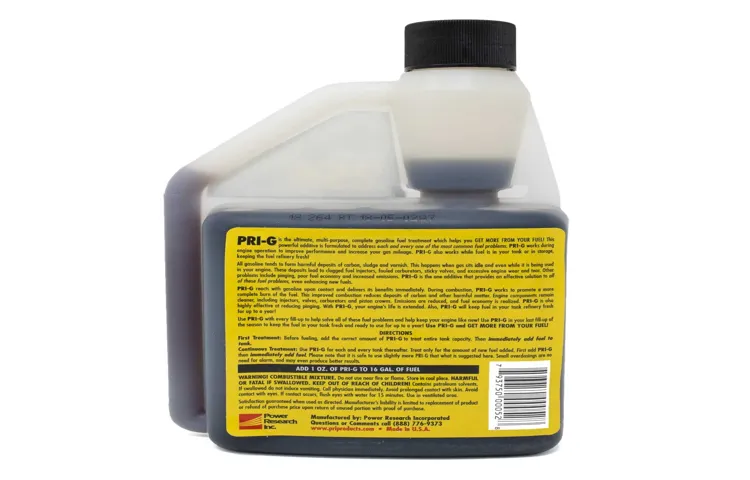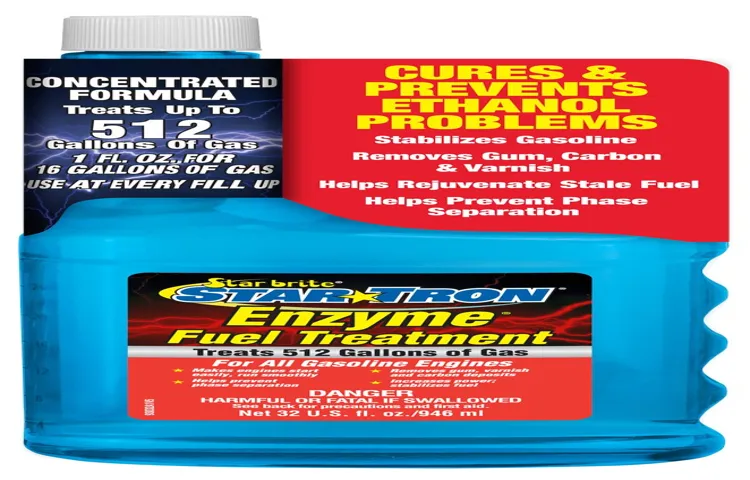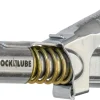Have you heard of stabilizer treated gasoline? If you’re someone who uses gasoline with any regularity, it’s worth understanding what this term means and why it matters. Essentially, stabilizer treated gasoline is fuel that has been mixed with a chemical additive designed to prevent the breakdown of the fuel over time. This can be especially important for those who use gasoline-powered equipment infrequently, as untreated gasoline can begin to degrade after just a few months.
But why does this matter, and how does stabilizer treated gasoline help? Think of it like this: you wouldn’t leave a loaf of bread on the counter for months on end without it going bad, would you? The same is true of gasoline. Over time, fuel can develop deposits, residue, and other compounds that can clog fuel systems, reduce engine performance, and even cause corrosion. Stabilizer treated gasoline works to prevent these issues by inhibiting the growth of microbes, which can be a common cause of fuel breakdown.
This, in turn, helps to prolong the life of tanks, engines, and other fuel-related equipment. If you’re not using stabilizer treated gasoline, you may be putting your equipment at risk – especially if you’re using it infrequently or storing it for long periods of time. But by taking the time to understand what stabilizer treatment is and how it works, you can be sure that you’re getting the most out of your gasoline, while keeping your equipment in top shape.
So if you’re not already using stabilizer treated gasoline, now may be the time to start!
Table of Contents
Introduction
Stabilizer treated gasoline is a type of fuel that contains a stabilizing additive to prevent it from breaking down over time. As gasoline ages, it can start to degrade and form harmful deposits that clog fuel lines and damage engine parts. Stabilizer treated gasoline, on the other hand, has a longer shelf life and can be safely stored for extended periods without the risk of it deteriorating.
This is particularly important for equipment that is not used frequently, such as lawnmowers, generators, and boats. Using stabilizer treated gasoline can help keep your machines in good working order and avoid costly repairs down the line. It’s important to note that not all gas stations carry stabilizer treated gasoline, so be sure to check before filling up.
Defining Stabilizer Treated Gasoline
Stabilizer treated gasoline is a fuel that has undergone a process that stabilizes it chemically. This process is done to prevent oxidation and deterioration of the fuel, which can lead to clogging of fuel lines and carburetor jets, as well as engine damage. The stabilizer also helps in reducing the formation of gums and varnishes that can occur in gasoline when it is stored for a long time.
This makes stabilizer treated gasoline an excellent fuel option for vehicles that are not used regularly or are in storage for extended periods. With stabilizer treated gasoline, you can be confident that your car’s engine will run smoothly even after being idle for an extended period, making it an excellent option for anyone looking for a reliable fuel choice. So, if you own a car that spends most of its time in storage or are planning a long trip and do not want to worry about the gasoline in your tank, stabilizer treated gasoline is the answer you need.

Why is Stabilizer Treatment Important?
Stabilizer treatment is essential in ensuring the longevity and functionality of various materials such as fabrics, papers, and even food products. It involves the addition of chemicals that prevent the growth of microorganisms, oxidation, and degradation caused by exposure to light, heat, and moisture. Stabilizer treatment plays a crucial role in maintaining the quality of products, preventing spoilage, and enhancing their appearance.
For instance, stabilizing agents in fabrics can prevent the growth of mold and mildew, making them durable and long-lasting. In foods, stabilizers prevent ingredients from separating and maintain their texture and flavor. Therefore, stabilizer treatment is critical in enhancing the shelf-life, quality, and value of materials and products, making it an essential aspect of many industries.
Benefits of Using Stabilizer Treated Gasoline
Stabilizer-treated gasoline is gasoline that has been mixed with a stabilizing agent to extend its shelf life and prevent it from deteriorating over time. What this means is that when you add stabilizer to your gasoline, you’re helping the fuel to retain its potency and stay fresh for a significantly longer period of time. This is particularly beneficial for people who own boats, motorcycles, and other small engines that are only used occasionally, as stale gasoline can wreak havoc on their engines.
In addition, stabilizer-treated gasoline burns cleaner than untreated gasoline and produces fewer emissions, which is better for the environment. By using a fuel stabilizer, you can save money on gas and help your equipment run more efficiently, making it a wise investment for anyone who relies on gasoline-powered machinery.
Improved Fuel Quality
Improved Fuel Quality, Stabilizer Treated Gasoline Using stabilizer treated gasoline can provide numerous benefits, one of which is improved fuel quality. Gasoline is prone to degradation, which can happen even before it is used due to factors like temperature changes, exposure to air and moisture, and the use of additives. This degradation can lead to the formation of varnish and sludge, which can clog fuel injectors and cause other engine problems.
However, by using stabilizer treated gasoline, you can prevent or slow down this degradation process, ensuring that your fuel stays fresh and clean for longer periods. This can improve engine performance, fuel efficiency, and overall vehicle health, saving you money in the long run. So, next time you fill up your tank, consider using gasoline treated with stabilizers to enjoy the benefits of improved fuel quality.
Longer Fuel Life
Using a gasoline stabilizer can significantly increase the lifespan of fuel, making it a worthwhile investment for anyone who wants to keep their engines running smoothly. Gasoline can degrade over time, particularly if it sits in a tank for too long without being used. This can result in a range of engine problems, from difficulties starting to clogged fuel injectors.
By adding a stabilizer to gasoline, the fuel’s lifespan can be extended, preventing it from breaking down and causing damage to an engine. Not only does this save money, as fuel doesn’t need to be replaced as frequently, but it also ensures that engines remain in top condition. For those who use gasoline-powered tools or equipment infrequently, a stabilizer is an essential investment that can help prevent costly engine repairs down the line.
Prevention of Engine Damage
Using a stabilizer treated gasoline can significantly reduce engine damage, making it a must-have for car users. There is a common misconception that gasoline has an unlimited shelf life, but this is not the case. Gasoline deteriorates over time, and when left untreated, the fuel produces varnish and sludge deposits that accumulate in the fuel system, carburetor, and intake valves.
These deposits can cause several problems like hard starting, stalling, and reduced engine power. Adding a stabilizer to gasoline before storing or during the offseason can prevent these issues. A stabilizer treated gasoline maintains its consistency and quality, allowing you to store fuel safely for extended periods.
The stabilizer forms a protective layer on the fuel surface, preventing the formation of varnish and sludge deposits. Stabilizer treated gasoline also prevents the accumulation of water in the fuel system, which can cause severe engine damage in extreme cases. Using stabilizer treated gasoline can also save you money in the long run since it prolongs the life of your engine and reduces the likelihood of expensive repairs.
By using a stabilizer, you avoid fuel becoming stale, which can lead to engine damage caused by deposits of varnish and gum. Ultimately, investing in stabilizer treated gasoline is a wise decision that ensures your car’s engine performs at its best all year round.
How to Use Stabilizer Treated Gasoline
Stabilizer treated gasoline is a type of fuel that has been infused with a stabilizing additive to prolong its shelf life and protect it against degradation from exposure to air and moisture. Using stabilizer treated gasoline is an essential way to ensure that your fuel-powered machines and equipment run smoothly over time. When using stabilizer treated gasoline, ensure that you mix it with the required proportion of fuel and additive as instructed by the manufacturer to prevent fuel damage.
Another significant advantage of using stabilizer treated gasoline is that it extends the life of your engine, reducing repair and maintenance costs over time. Therefore, incorporating stabilizer treated gasoline into your fueling practices is an excellent way to improve equipment performance and maintain cost-effectiveness in the long run.
Proper Mixing Ratio
Using stabilizer treated gasoline is the best way to extend the life of your fuel and keep your engines running smoothly for longer periods of time. But, what is the proper mixing ratio when using this type of fuel? The truth is that it depends on the specific type of stabilizer and gasoline you are using, but most manufacturers recommend a ratio of one ounce of stabilizer per gallon of gasoline. This makes it easier to mix and ensures that the stabilizer is evenly distributed throughout the fuel.
However, some fuel stabilizers may require slightly different ratios, so it’s always best to check the label or the manufacturer’s instructions before adding stabilizer to your gasoline. Using too much or too little could have negative effects on your engine’s performance, so it’s important to follow the recommended ratios closely. With the right mixing ratio, you can enjoy the benefits of stabilized gasoline for longer periods of time and reduce the need for maintenance and repairs.
Storage Guidelines
Stabilizer-treated gasoline can be a game-changer when it comes to storing fuel for your vehicle. Using this treated gasoline is just like using regular gasoline, but with the added benefit of an extended shelf life. It’s essential to use the appropriate amount of stabilizer to the gasoline to achieve the best results.
Typically, the ratio is one ounce of stabilizer to two and a half gallons of gasoline. When it comes to storage, it’s crucial to store the treated gasoline in tightly sealed, approved containers that are void of any moisture or debris. Exposure to air can cause the gasoline to break down, which can lead to fuel system issues and equipment damage.
In summary, utilizing stabilizer-treated gasoline is a practical solution to storing fuel and maintaining optimal performance levels for your engines.
Conclusion
In conclusion, stabilizer treated gasoline is like a superhero for your engine – it protects against the evils of time and oxidation, ensuring that your fuel remains fresh and efficient. It’s the ultimate sidekick for any vehicle, giving you a smooth and reliable ride every time. So, next time you fill up your tank, remember to give a little nod of appreciation to your trusty stabilizer treated gasoline!”
FAQs
What is stabilizer treated gasoline?
Stabilizer treated gasoline is fuel that has an added chemical stabilizer to prevent the fuel from breaking down and oxidizing over time.
Why is stabilizer treated gasoline important?
Stabilizer treated gasoline is important because it can prevent fuel-related problems, such as engine deposits, gumming, and varnish buildup.
Can stabilizer treated gasoline be used in all types of engines?
Yes, stabilizer treated gasoline can be used in all types of gasoline-powered engines, including boats, cars, motorcycles, lawnmowers, and chainsaws.
How long does stabilizer treated gasoline last?
The longevity of stabilizer treated gasoline depends on the specific product and storage conditions, but it can typically last for up to two years when stored properly.
Is it necessary to use stabilizer treated gasoline if I don’t use my equipment frequently?
Yes, if you don’t use your equipment frequently, it’s recommended to use stabilizer treated gasoline to prevent fuel-related problems that can arise from fuel sitting in the tank for extended periods.
Can I use stabilizer treated gasoline with other fuel additives?
It’s not recommended to use stabilizer treated gasoline with other fuel additives because it can negatively affect the stability of the fuel.
Can stabilizer treated gasoline be used in ethanol-blend fuels?
Yes, stabilizer treated gasoline can be used in ethanol-blend fuels, but it’s important to use a stabilizer specifically designed for ethanol-blend fuels.



